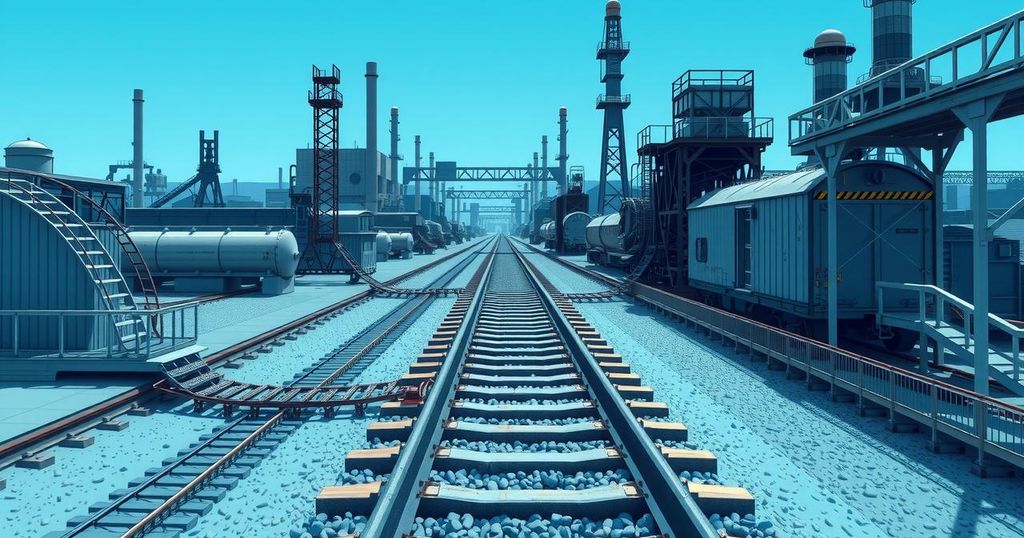ArcelorMittal Liberia threatens legal action against the Liberian government over proposed multiuser rail access for Ivanhoe Atlantic, claiming it violates existing agreements. The GOL seeks to implement a new rail system to encourage economic growth and competition. Despite AML’s objections, the government remains firm in its approach, signaling a significant shift in Liberia’s railway management and economic strategy.
The dispute over Liberia’s railway infrastructure has escalated, as ArcelorMittal Liberia (AML) has threatened the Government of Liberia (GOL) with legal action regarding a proposed multiuser agreement with Ivanhoe Atlantic. In a leaked email, AML’s CEO, Michiel van der Merwe, argued that this plan violates AML’s existing Mineral Development Agreement (MDA).
As Liberia approaches the implementation of Executive Order 136, which seeks to establish an independent rail operator regime by 2030, AML’s concerns center on maintaining its rail monopoly. The government’s intention is to allow multiple mining firms, including Ivanhoe Atlantic, access to transport iron ore via the Yekepa-Buchanan railway, thereby generating significant revenue for the nation.
AML asserts that the government’s negotiations with Ivanhoe Atlantic infringe upon its contractual rights outlined in the MDA, alleging that the deal compromises its operational capacity. The company further claims that Ivanhoe’s ability to construct additional rail infrastructure violates AML’s rights, having invested over US$3 billion since 2005.
AML’s warning suggests that if the GOL proceeds with the arrangement, it will consider taking legal action. A government insider remarked that Liberia will prioritize its economic interests in leveraging infrastructure assets for national benefit. AML’s past approaches to arbitration may lengthen any potential legal confrontation, possibly delaying its own expansion efforts.
Despite AML’s threats, the Liberian government remains committed to implementing a multiuser rail model. Minister of Mines and Energy, Wilmot Paye, has confirmed this determination, suggesting that the government aims to negotiate third-party access to boost economic growth.
Cllr. Frank Musah Dean, former Minister of Justice, provided a legal opinion asserting that granting Ivanhoe access was consistent with the MDA and that multiuser access was contemplated within the agreement. The previous National Legislature also expressed rejection of the MDA renewal based on public consultations highlighting the importance of diversifying rail access.
Liberia’s move to a multiuser rail system is pivotal for its economic strategy, unlocking untapped resources and promoting competition among mining companies. Experts predict that the transition could generate substantial revenues, create jobs, and stimulate investments.
The Inter-Ministerial Concessions Committee has begun implementing steps toward this transition, including establishing national rail standards and selecting an independent rail operator. Meanwhile, Ivanhoe Atlantic is prepared to engage in initial shipments, further articulating its commitment to the multiuser framework.
As AML navigates its next steps, it faces a choice: maintain its monopoly or adapt to the realities of the government’s rail policy, which has garnered public support. Liberia’s commitment to a multiuser access model reflects a broader economic transformation, challenging AML’s historical dominance while asserting the nation’s sovereignty over its infrastructure.
In summary, the conflict surrounding Liberia’s railway infrastructure highlights the tensions between ArcelorMittal Liberia and the Liberian government regarding the transition to a multiuser rail system. The GOL aims to allow access for multiple mining companies, which is seen as a strategy to enhance economic growth and leverage the nation’s resources effectively. As AML contemplates legal action to protect its monopoly, the focus remains on the government’s commitment to implement this policy, despite the company’s objections. The coming days will be critical in determining the trajectory of this dispute, potentially shaping the future of Liberia’s economic landscape.
Original Source: www.liberianobserver.com




